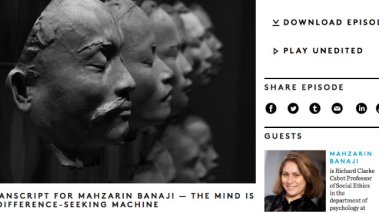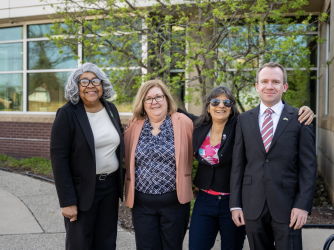Table of Contents
Harvard Professor on the Challenges of Reconciling Safety and Discomfort in the Classroom

Last month, Harvard University psychology professor Mahzarin Banaji gave an interesting interview on the public radio show and podcast On Being, hosted by Krista Tippett. The interview focuses primarily on Banaji’s work on the science of implicit bias, which is the focus of her co-authored book, Blindspot: Hidden Biases of Good People. However, Tippett and Banaji took a few minutes to talk about the latter’s experience as a professor as the debate continues on campuses nationwide about the need for what some students term “safety” in the academic environment.
“It’s making all of us deeply uncomfortable,” Banaji said of the discussions happening on college campuses. “And I think this is terrific.”
At Harvard, for example, increased student diversity on campus has brought with it conversations about minority students’ feelings of discomfort within the institution. Banaji explains how these conversations are affecting her classroom and role as a professor:
I come from a tradition, a Western tradition, I will add, where the desire to be and make students in your class uncomfortable is your mission. It is my job to tell people to feel uncomfortable, to squirm, to go back and think hard about where they come from, and so on. And now I’m being told that when I say that, I’m making somebody possibly uncomfortable. And I’ve argued forever this is a safe room in which we can say anything, and we will deal with it. Because if we don’t, we’ve basically given up the most fundamental aspect of who we are and what we prize and value, and what I believe is at the heart of social change.
Banaji discusses the power of challenging dialogue in the classroom, but also addresses the real and serious social tensions underlying her students’ desire to feel safe. She grapples with how she can address and integrate sometimes competing values in her teaching, but ends with an optimistic view:
How am I to make people for whom the world is unsafe feel safe, and equally safe? So this is complex. There’s nothing about this issue that is simple, but I have every faith that we will come out of it if we don’t hold back, if we keep talking, and if we try to understand what the other is saying.
Banaji’s comments provide an interesting perspective from a faculty member who clearly cares about her students and the integrity of their education. They’re also timely in light of recent headline-making campus protests. Banaji herself appears to engage with uncomfortable issues in trying to create a classroom that is a safe space for her students to do the same.
I recommend listening to Banaji’s entire June 9 On Being interview.
Recent Articles
FIRE’s award-winning Newsdesk covers the free speech news you need to stay informed.

VICTORY: Michigan town declares Sept. 6 ‘First Amendment Day’ after FIRE sues its mayor for shouting down residents

USC canceling valedictorian’s commencement speech looks like calculated censorship

Back into the FIRE: Hasen’s response to FIRE and Rohde: Don’t read the press clause out of the Constitution — First Amendment News 420
